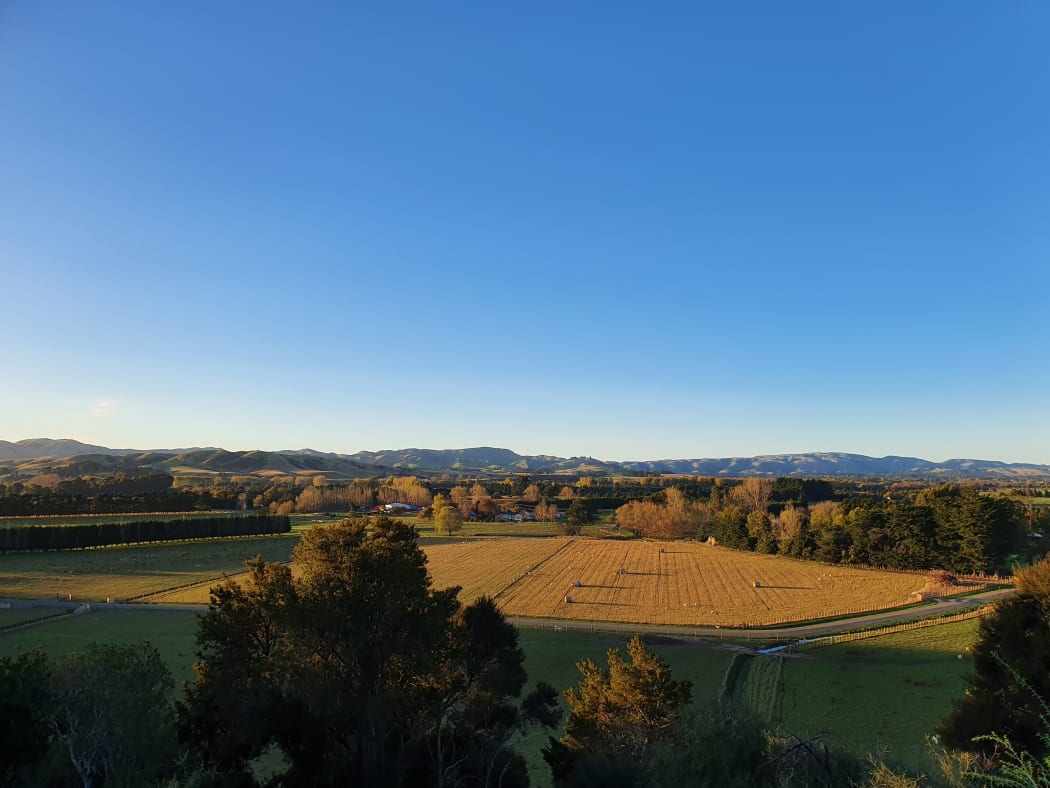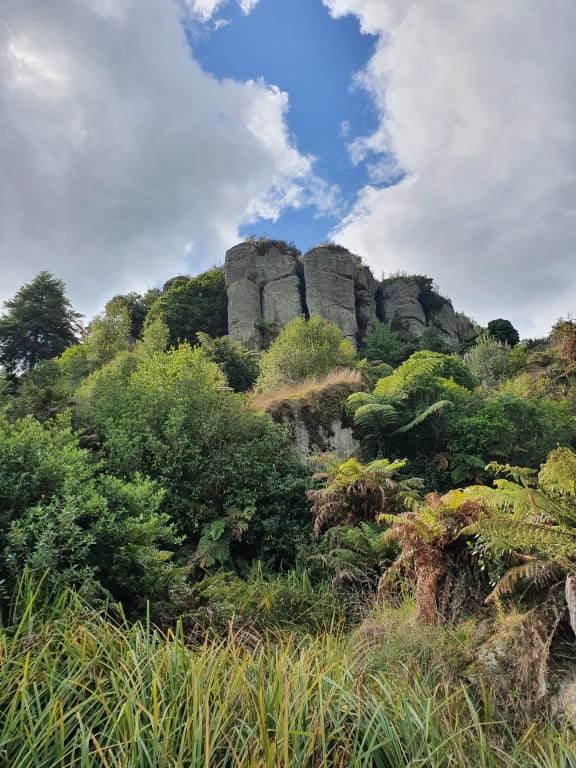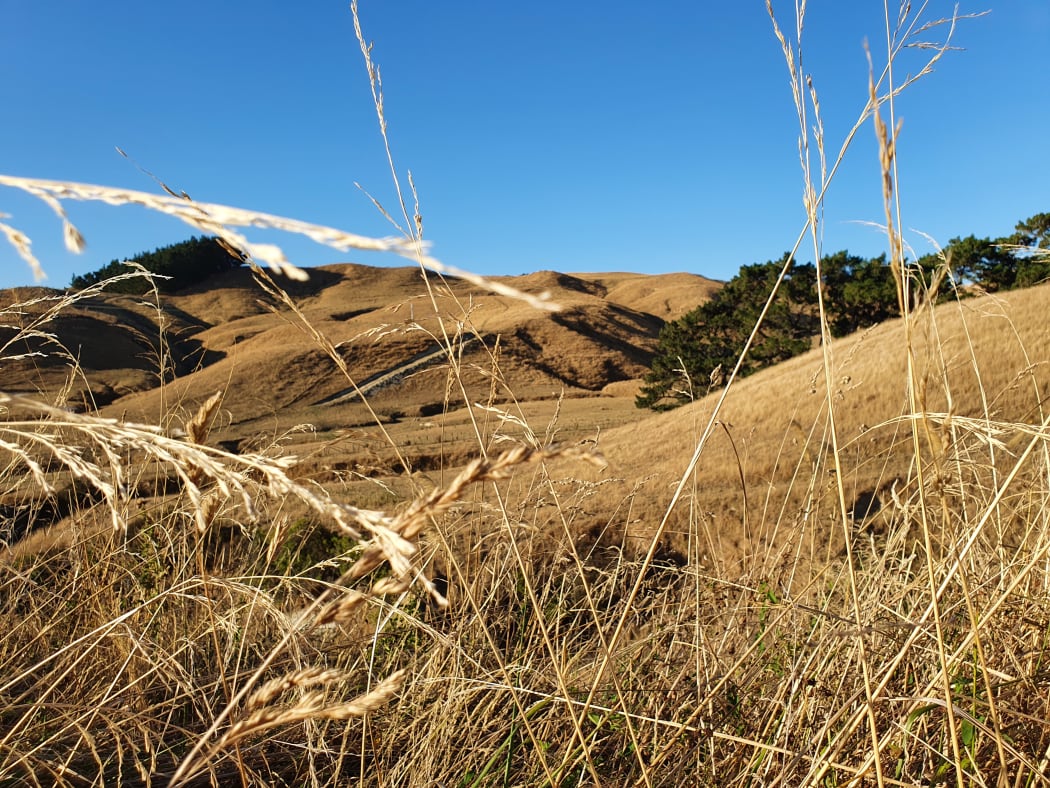
Photo: RNZ/Sally Round
In the Far North, the weather has been beautiful There've been several good dollops of rain since ANZAC weekend which has made the pasture come away. A farmer says he's been frantic since early January dealing with the drought and then Covid-19 rules but in the last 2 weeks he's started to see a way forward. The fertiliser spreader has been busy putting nitrogen on and a shipment of palm kennel will arrive next week. Stock numbers are down about 40% to where they would usually be.
Around Pukekohe 65 mm of rainfall to start the week off was just what the district needed. Runoff was insignificant. In the mild weather, crops have been growing faster than they have for months. With the country gradually moving out of lockdown, growers must be questioning the extent of their plantings for domestic consumption as its been in the news that home gardeners have planted vegetables like never before..well in recent times anyway. Growers will be wondering whether we're heading for a gross oversupply of vegetables this winter?
In parts of Waikato, the ground is damp underfoot from rain last weekend. It's been fairly windy during the day, but the sun is shining making conditions ideal for grass growth. Heifers are home for the winter.

Photo: RNZ/Carol Stiles
King Country's welcomed rain. It's been a job fattening animals in the dry conditions - some should have gone to processing a long time ago but are still not quite ready.
Mount Taranaki was looking fantastic on Friday with snow down to the ski fields. farmer have been spared the frosts that clears skies, snow and a full moon usually bring. It's also rained a lot this week - the farmer we rang has had 100 millimeters - 50 of those in the one day. However he says over all the province has had between 40 and 60 percent of its usual April rainfall. He's drying off this week and is going in to winter with plenty of supplementary feed and grass. Facial eczema spore counts are still surprisingly high - 30 thousand last week on his farm.
The Gisborne region's has had a mixed bag of weather - wonderful rain's fallen but it's been patchy and some areas are terribly dry. Pregnancy scanning's underway in cows - some people have had cracker results but others minor disasters - they're being put down to the drought. Getting shearing done turning out to be a bit of a rigmarole - in the Gisborne area there are mainly smaller, four stand sheds - and with Covid restrictions that means only two shearers can work at a time. There's been a suggestion farmers also use their neighbour's woolshed to held get through the work - but in some cases the closest neighbour's shed is 60 kilometres away.
Drought stricken Hawkes Bay's had cloudless skies, crisp cool mornings and zero humidity. The chair of the rural advisory group, which is the lead agency for the drought and Covid response, says his advice to farmers is to keep talking, keep planning and keep going. He says having a plan helps you sleep better at night - and it doesn't matter if you have to change the plan. He says the difference between this drought and others is in Hawkes Bay's history is that in spring, there are likely to be good prices for stock. He says it is worth spending 20 cents per ewe a day on feed she's going to be worth 130 dollars and she's carrying an average of one and a half lambs then that's 250 dollars worth of animals.

A parched paddock in southern Hawkes Bay Photo: RNZ/Sally Round
Wairarapa had a light frost on Friday and has been very warm for the time of year. Forty millimeters of rain fell at the beginning of the week and that's really helping kick growth along. Rams are coming out of the paddocks and farmers are busing putting fence lines up - happily placing orders for materials in their local communities.
It's been a wet and wild week in Manawatu and Rangitikei. Thunderstorms brought nearly 50mm's of rain. One farmer says winter's definitely on the way. Most mornings have barely reached 3 degrees when he's got up to milk the cows.
Horowhenua enjoyed a weekend of rain and has warmed up as the week's progressed. Vegetable growers will be very pleased when the country moves to level two as more avenues will open up for them to sell their produce. In Auckland more than half of all vegetables are sold outside supermarkets.
The top of the South Island had good rain last weekend and the moisture will encourage some growth, but feed levels will still be low going into winter and many farms still look drought like. Winter will be hard. Supplementary feed levels are very low and there isn't surplus around to buy. There were also a few frosts near the sea during the week. Some farms are still carrying extra stock, there are still queues at meat works and not many buyers for store stock. Dairy farmers will probably keep milking until the end of the month.
Last weekend our Marlborough high country contact was getting ready to sell capital stock this week if the rain didn't arrive. It did !! 61 fabulous millimetres.. but there's no way the farm will recover in time for winter so supplementary feed will have to purchased, and that's a very expensive option, and calves are being sent to Banks Peninsula for grazing. Capital stock won't be sold off yet, but the option's still lurking on the cards
There were a couple of good frosts here this week as well. Farms are greener near Kaikoura where there was rain a few weeks ago.
On vineyards, more workers are needed. Some owners are re-training summer pruning staff as winter pruning staff.. there's quite a difference between the two skills. In some cases RSE workers who haven't been able to go home yet are up for re-training. Apparently on one orchard a new gang has set up using back packers and local kiwis in their 20s, and some tertiary students doing one year diplomas are considering ditching study for a year, working and then starting back again next year.
On the West Coast, the weather has been all over the place. There have been a couple of hard frosts, a few good showers and some fine days as well. People are starting to dry cows off. The last of the lime is going on and the pasture cover is back. Our contact says he's getting a bit tired of the Covid-19 rules and is looking forward to catching up with his mates over a beer, he hasn't seen them in nearly 2 months.
North Canterbury has patches that look good but it really is a green drought .. pasture covers are low. Further down into mid Canterbury and the warm weather is continuing which is great for those with irrigation as grass is growing, but dryland areas are still in drought. Getting surplus stock off farms remains a very big issue, farmers are all hoping saleyards can open in some form soon. Winter feed levels remain tight across the region with straw and baleage also in short supply.
In the Mackenzie Basin, the weather has been amazing, usually this time of the year it would feel like winter is fast approaching but the farmer we spoke to says in feels like a nice spring day. Tupping is well underway and the ewes are flushing well. The cows had a clear TB test early this week.
Cold mornings are greeting South Otago farmers. There was a nice shower a few days ago, about 10 millimetres worth so pastures are looking good. Farms have supplements on hand. Some are still trying to shift lambs to the works. Dairy farmers are having a good end to the season. Winter crops are chugging along okay too.
In Southland, near Drummond, there have been bits and pieces of rain and it's been mostly overcast. The farmer we spoke to is just doing a bit of maintenance and some relief stock truck driving at nights for a local carrier. He says that if we move to Covid-19 alert level 2 next week his wife, who is a teacher will go back to work and the kids back to kindy. He is looking forward to having the TV back during his lunch.

